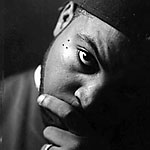 |
|
|
::: Main :::
Interact |
b. O'Shea Jackson, 15 June 1969, Crenshaw,
South Central Los Angeles, California, USA. Controversial
hardcore rapper who formerly worked with the equally
inflammatory NWA. Following a relatively stable
background, with both his mother and father working at
UCLA, Cube entered the homeboy lifestyle: 'One day I was
sitting in class with a friend called Kiddo and we had
some time on our hands, so he said let's write a rap'. At
the age of 16 he penned his first important rap, 'Boyz 'N
The Hood', which was later recorded by Eazy-E. He
subsequently spent time with CIA, an embryonic rap outfit
produced by Dr. Dre. As guest lyricist, he brought NWA '8
Ball' and 'Dopeman', which would comprise their opening
salvo. After studying architectural draughtsmanship in
Phoenix, Arizona, he returned to the NWA fold in time for
1989's groundbreaking Straight Outta Compton.
He would leave NWA at the tail-end of the year, amid
thinly veiled attacks on their Jewish manager Jerry
Heller. His debut AmeriKKKa's Most Wanted,
recorded with Public Enemy producers the Bomb Squad, drew
immediate mainstream attention. The album's controversial
lyrical platform included homophobia and the
glamorization of violence, although his work was attacked
primarily for its overt sexism, raps about kicking a
pregnant girlfriend ('You Can't Fade Me')
notwithstanding. Conversely, Ice Cube overlooked a
production empire (Street Knowledge) run for him by a
woman, and he also fostered the career of female rapper
Yo Yo (who appeared defending her gender on AmeriKKKa's
Most Wanted's 'It's A Man's World'). The politicization
of his solo work should also be noted; in his NWA days he
had once written, 'Life ain't nothing but bitches and
money', but his words since then have incorporated
numerous references to black ideology that add up to
something approaching a manifesto. His defence against
critical discomfort with his rhymes, 'I put a mirror to
black America', has been hijacked by many other, less
worthy cases. Following the mini-album Kill At Will, he
released another highly controversial set, Death
Certificate, which included outrageous tracks
such as the Heller-baiting 'No Vaseline' and 'Black
Korea'. Nevertheless, the album was a huge commercial
success, reaching US number 2 at the end of 1991. To Ice
Cube's credit, he went on to produce two excellent sets,
the chart-topping The Predator (including the single 'It
Was A Good Day', which gave him a massive profile via MTV
) and Lethal Injection. The latter, in particular,
boasted a much more discursive approach to the problems
of the ghetto, including reflections on the Los Angeles
riots and the Rodney King beating. Perhaps it was marred
by the blunt sexism of tracks such as 'Cave Bitch', but
it was certainly an advance which demonstrated the
influence of his recent conversion to the Nation Of
Islam. Musically it was typified by a stirring cover
version of 'One Nation Under A Groove', retitled 'Bop Gun
(One Nation)', with a lead vocal by the song's writer,
George Clinton. Having completed four million-selling
albums, his career had also attracted the attention of
those outside the hip-hop fraternity. Like Ice-T, Cube
was targeted on right wing assassination lists discovered
by the police in 1993. Following the release of Lethal Injection, which experimented with the G-funk stylings of Dr. Dre's hugely successful The Chronic, Ice Cube elected to concentrate on his commercial interests. Street Knowledge had already provided Da Lench Mob and Kam with successful albums on which Cube acted as executive producer, and he set up a second subsidiary, titled after his posse, Lench Mob. He also consolidated his movie career by moving into writing and production. Cube had already starred in John Singleton's 1991 hit movie, titled after his first rap, Boyz N The Hood, and later appeared in the same director's Higher Learning. The 1992 movie Trespass, retitled after the LA Riots deemed original moniker Looters unsavoury, saw him team up with Ice-T once more. His several screenplays included the 1995 comedy Friday. The soundtrack to his 1998 directorial debut, The Players Club, was a Top 10 success in the USA. The movie itself, set in a strip club had grossed $20 million at the box office only six weeks after its April release. Even more successful was February 2000's Next Friday. In 1996, Cube returned to recording with Westside Connection, a hip-hop supergroup he formed with rappers Mack 10and WC. The violent gangsta rap musings on Bow Down may have alienated some critics, but the album helped revive Cube's commercial fortunes, breaking into the US Top 5 shortly after its release. Two years later he released his first solo set in over five years, War & Peace, Vol. 1 (The War Disc), a failed attempt to recapture the intensity and shock value of his earlier albums. |

